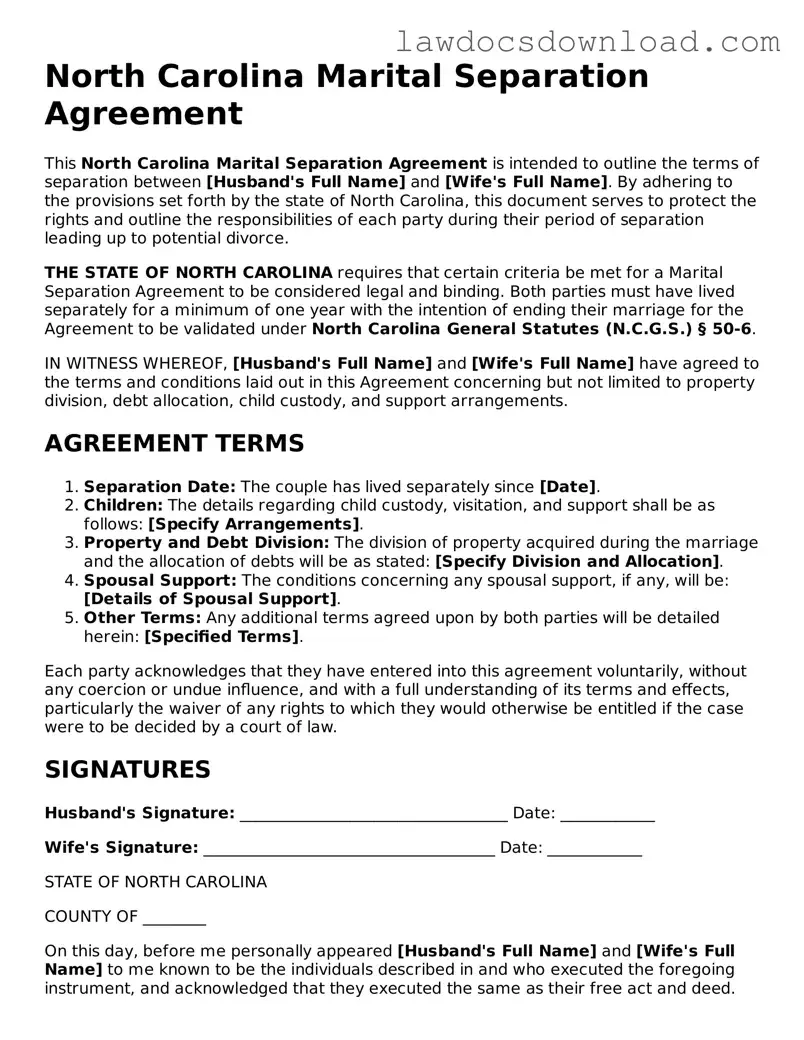The North Carolina Marital Separation Agreement form shares similarities with a Property Settlement Agreement. Both documents are designed to establish the division of assets, liabilities, and property among spouses. They detail how real estate, personal property, and financial obligations will be allocated, typically requiring detailed negotiation to mutually satisfy both parties. The primary goal is to avoid future disputes by clearly outlining who gets what, including arrangements for any shared debts.
Comparable to the Divorce Settlement Agreement, the Marital Separation Agreement in North Carolina is crucial for detailing the terms of a divorce before it is finalized in court. Both agreements cover not only the division of assets and debts but also may address spousal support, custody arrangements, and visitation rights for any children involved. Their purpose is to ensure that both parties have a clear understanding of their rights and obligations post-divorce, streamlining the legal process.
Similar to a Custody Agreement, a Marital Separation Agreement can specify arrangements for child custody and visitation schedules. While a Custody Agreement focuses exclusively on the wellbeing and living arrangements of children, the Marital Separation Agreement encompasses this as part of a broader scope of divorce or separation terms. Both are integral in providing a stable and agreed-upon environment for children after their parents' relationship ends.
A Pre-Nuptial Agreement, much like the Marital Separation Agreement, involves discussions and decisions about the division of assets and debts. However, the Pre-Nuptial Agreement is entered into before marriage, whereas the Marital Separation Agreement is executed when a marriage is ending. Both serve to protect individual interests, but they do so at opposite ends of a marriage.
The Post-Nuptial Agreement, akin to the Marital Separation Agreement, is a contract between spouses concerning the division of assets, liabilities, and other financial matters. Unlike the Marital Separation Agreement, which is executed upon the dissolution of marriage, the Post-Nuptial Agreement is created after the marriage has occurred but before any separation or divorce, often with the aim of avoiding disputes should the marriage end.
An Alimony Agreement is closely related to the financial aspects of the Marital Separation Agreement, as it specifically outlines the conditions under which one spouse will provide financial support to the other post-separation or divorce. While an Alimony Agreement concentrates exclusively on the financial support aspect, the Marital Separation Agreement might contain this alongside various other terms of the separation or divorce.
A Child Support Agreement is analogous to sections within the Marital Separation Agreement, dealing directly with the financial aspects of child care following a separation or divorce. It determines how expenses related to the child’s upbringing are divided between the parents. Thus, while the Child Support Agreement focuses on the wellbeing of the child, the Marital Separation Agreement addresses this within the wider context of distributing marital responsibilities and assets.
The Debt Settlement Agreement shares a financial focus with the Marital Separation Agreement, particularly in addressing how joint debts incurred during the marriage are managed post-separation. Both aim to resolve financial obligations to prevent future disputes, ensuring each party knows their responsibilities in clearing shared debts or individually assigned liabilities following the dissolution of the marriage.
The Separation Agreement & Child Custody Plan, specific to instances involving children, has significant overlap with the Marital Separation Agreement. Both clarify terms related to the care, custody, and financial support of children post-separation. The key objective is to create a stable and supportive environment for the children, despite the changing dynamics of the parents' relationship.
Finally, the No-Fault Divorce Agreement resembles the Marital Separation Agreement in its purpose to outline the terms for ending a marriage without assigning blame to either party. It focuses on the mutually agreed-upon conditions for separation, including asset distribution, child custody, and potentially alimony. Both documents are instrumental in facilitating a peaceful and fair end to a marriage, emphasizing cooperation and agreement over contention.

